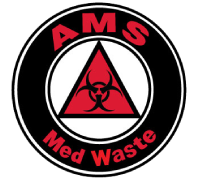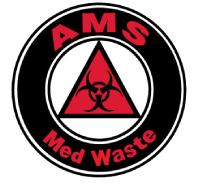In the healthcare industry, ensuring patient safety goes beyond treatment and care. Effective medical waste disposal plays a critical role in safeguarding staff, patients, and the environment. AMS Med Waste, your trusted partner in compliant medical waste disposal for hospitals and clinics throughout Chicago, emphasizes the importance of proper waste identification as the foundation of a successful medical waste management plan.
Understanding Medical Waste Categories:
Medical waste encompasses a diverse range of materials generated during healthcare procedures or research activities.
Here’s a breakdown of some key categories, with references to relevant regulations for clarity:
- Potentially Infectious Medical Waste (PIMW): Blood and bodily fluids, contaminated PPE, cultures and stocks, and contaminated bandages fall under this category (as defined by the Illinois Environmental Protection Agency). These materials require specific handling and disposal to prevent the spread of infection, as outlined in the U.S. Environmental Protection Agency’s Medical Waste Management regulations.
- Regulated Medical Waste (RMW): Sharps containers filled with needles, syringes, scalpels, and other sharp objects belong to this category. RMW requires special handling due to the high puncture risk, as mandated by the EPA’s aforementioned regulations.
- Pathological Waste: Human tissues, organs, body parts, and fluids removed during surgery, autopsy, or other procedures are classified as pathological waste. Specific protocols govern their disposal to ensure proper respect and hygiene, as detailed in the Joint Commission’s Standards for Handling Hazardous Materials.
- Chemotherapy Waste: Contaminated materials used in cancer treatment, such as IV tubes, vials, and leftover medication, require specific handling and disposal due to their hazardous properties. Refer to the EPA’s guidelines for Chemotherapeutic Wastes for proper disposal procedures.
AMS Med Waste: Your Partner in Streamlined Segregation & Disposal:
AMS Med Waste goes beyond basic collection. We offer a comprehensive suite of services to ensure safe and compliant medical waste management at your facility:
- Clear Segregation Solutions: We provide a variety of color-coded bins and signage specifically designed for each waste category (PIMW, RMW, Pathological, Chemotherapy, etc.). This visual system minimizes confusion and promotes proper waste disposal practices by your staff.
- Expert Training Programs: Our experienced team conducts in-depth training sessions for your staff. These sessions cover proper waste segregation, handling, and disposal procedures for every waste type, ensuring everyone understands their role in responsible waste management.
- Sustainable Disposal Options: AMS Med Waste prioritizes environmentally friendly solutions. We offer advanced processing techniques that convert medical waste into a cleaner-burning fuel source, diverting it from landfills and incineration.
Beyond the Basics: Resources and Support
We understand that navigating medical waste regulations can be challenging. AMS Med Waste is here to support you every step of the way:
- Our informative website: It provides detailed information on acceptable and unacceptable materials for each waste category, referencing relevant regulations for clarity.
- A dedicated team of professionals: Available to answer your questions and provide ongoing guidance on proper waste management practices.
Effective medical waste management is an ongoing commitment. By partnering with AMS Med Waste, you gain access to the expertise, resources, and support needed to ensure a safe, compliant, and environmentally responsible approach to medical waste disposal in your Northern Illinois facility. Contact us today to discuss a customized plan that empowers your staff, optimizes operations, and safeguards your environment.
Remember: By prioritizing proper medical waste identification, you’re not just following regulations, you’re building a safer, healthier environment for everyone.






